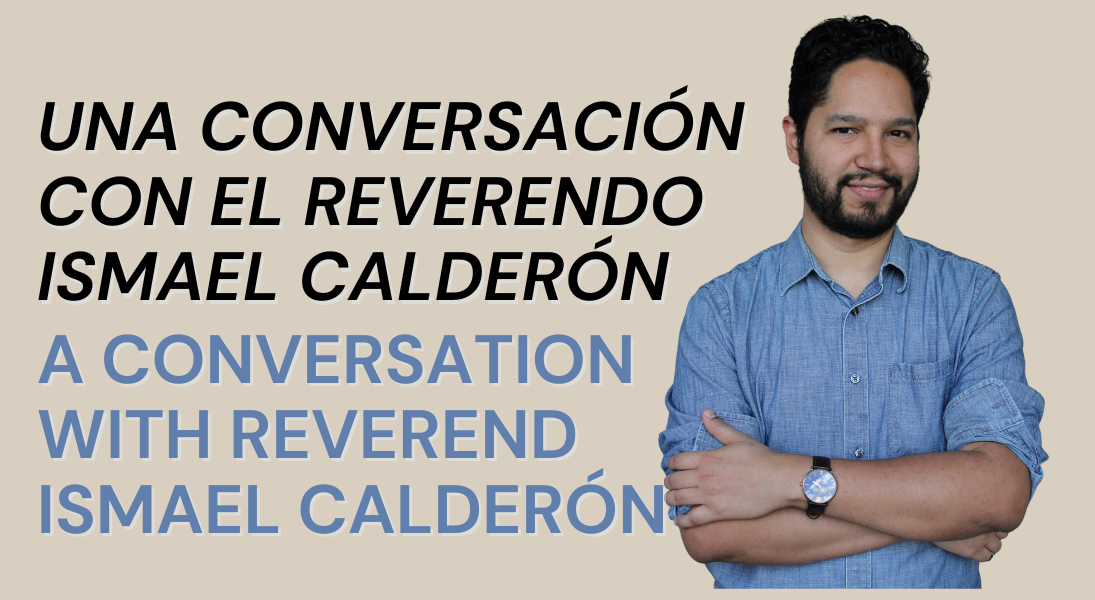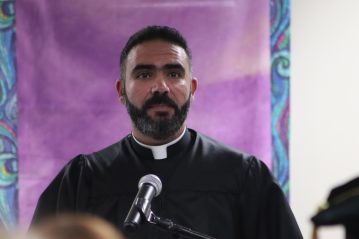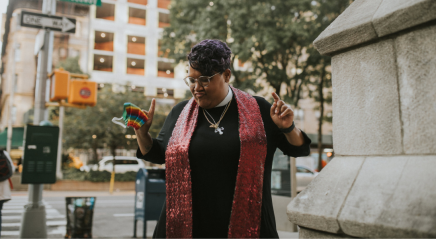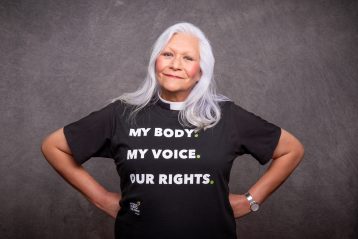The ELCA has a beautiful tapestry of cultures and identities that make up the church. We want to celebrate June and Pride Month with a focus on our LGTBQIA+ Lutherans. We are excited to amplify the voices of our ELCA siblings who are proud to be a part of the LQBTQIA+ community and work to affirm and embrace everyone in the church. Today we are speaking with Reverend (Reverendo) Ismael Calderón.
En Español:
¿Cómo estás conectado con la ELCA?
Nací en Caracas, Venezuela, en una familia de inmigrantes colombianos. A los 9 años mi familia tuvo que emigrar a Colombia debido a la inseguridad, e inestabilidad política en el país. Viví durante 16 años en Colombia, donde obtuve una Licenciatura en Relaciones Internacionales, y Análisis en Seguridad Internacional. Antes de mi llamado al Ministerio, serví como profesional de Asuntos Internacionales durante 11 años, en una oficina ministerial del gobierno colombiano.
En los Estados Unidos, trabajé como miembro de AmeriCorps VISTA, una iniciativa de la Corporación para el Servicio Nacional y Comunitario. Mi papel era ser un puente de comunicación entre el servicio nacional, y las organizaciones sin fines de lucro, sirviendo a niños de color en riesgo, y de bajos ingresos en el condado de Lake, Illinois. Especialmente, en comunidades locales de Waukegan, North Chicago y Zion. Para lograr estos objetivos, la organización asociada fue United Way of Lake County. Durante este período, me uní a la Iglesia Luterana Sagrado Corazón, (Parroquia Luterana Sagrado Corazón), en Waukegan, (donde inicialmente, trabajé en asociación con la Iglesia Sagrado corazón, para abogar y proporcionar servicios legales a la población inmigrante indocumentada). Me convertí en miembro; Luego serví como presidente del consejo de la iglesia. -Dios comenzó a llamar a mi puerta. El llamado al ministerio se hizo más claro en este punto.
Después de darme cuenta de la dura realidad, y las necesidades de personas en pobreza, e inmigrantes en el condado de Lake, decidí trabajar como Coordinador de Alcance, y Administrador de Casos en Hispanic American Community Education and Services, en Waukegan. Abogué por derechos justos de inmigración, asistiendo, asesorando, y educando a los solicitantes para regularizar sus estatus migratorios con los Servicios de Ciudadanía e Inmigración de los Estados Unidos. La Iglesia Sagrado Corazón, se convirtió en un referente, y un refugio seguro para una población inmigrante vulnerable, beneficiarios de TPS, que vivían con miedo en ese momento.
En 2018, Dios todavía estaba llamando a mi puerta. Apliqué a la Escuela Luterana de Teología en Chicago (LSTC), donde obtuve una Maestría en Divinidad, para convertirme en ministro de Palabra y Sacramentos en la Iglesia Evangélica Luterana en América. Mientras estudiaba, trabajé como Coordinadora de Learning Partners, en el Centro de Recursos y Escritura de Idiomas en el seminario, donde ayudé, asesoré y apoyé en su viaje académico a estudiantes internacionales, cuyo idioma nativo no es el inglés. También, fui miembro del Public Church Fellowship Program parte del liderazgo de la Asociación de Estudiantes Internacionales, y Equipo de Transformación Antirracista en LSTC. Adicionalmente, fui miembro de la Estrategia Latinx del Sínodo Metropolitano de Chicago.
Después de obtener mi título, fui llamado y ordenado para servir como pastor en la Iglesia Luterana de San Marcos en Coral Gables, Florida. Recientemente, participé como miembro con derecho a voto en la Asamblea del Sínodo Florida-Bahamas, donde el Obispo Pedro Suárez fue reelegido.
¿Cómo moldea y afirma tu fe tu persona/identidad?
Como hombre gay, persona de color e inmigrante, no he sido ajeno a los problemas sociales y la interseccionalidad que afectan a nuestro mundo. Como pasante-interno, apoyé el proceso de la Iglesia Luterana de San Pablo en Waukegan, convirtiéndose esta, en una comunidad de “Reconciliación en Cristo”. Fue una experiencia extraordinaria, el abrir espacios sagrados para conversaciones intencionales sobre temas relacionados con la comunidad LGBTQIA+ en nuestra iglesia, y así también, facilitar espacios para capacitaciones contra el racismo. Además, hubo discusiones en grupos pequeños dentro de la congregación para reflexionar sobre estos temas.
Mi relación con Jesús se ha profundizado, y transformado con el tiempo. Jesús ha sido mi fortaleza, y resiliencia en la vida. Él ha sido mi compañero en batallas, en tiempos difíciles, y ha secado mis lágrimas cuando sentí que todo estaba perdido. En otras palabras, Jesús es la razón por la que todavía estoy vivo.
La fe en Dios lo es todo para mí. Mi fe está siendo moldeada, y afirmada por el Evangelio de amor de Jesucristo, y su llamado a proclamar ese amor incondicional a mi prójimo. Siempre refuerza mis oraciones matutinas y nocturnas con afirmaciones de gratitud. Jesús continuamente está diciéndome, que he sido, y siempre seré un hijo amado de Dios.
¿Cuáles son sus esperanzas y expectativas para la forma en que la iglesia puede apoyarlo y afirmarlo?
Acciones: Somos la iglesia de Cristo. Estamos llamados a proclamar el evangelio de amor incondicional de Dios al mundo. Esa debe ser la prioridad. Necesitamos difundir ese mensaje de amor a nuestros hermanos de la comunidad LGBTQIA+, que necesitan escucharlo ahora más que nunca. Somos y siempre seremos hijos de Dios. No me malinterpreten: la defensa es importante, pero el evangelismo es más crucial en el contexto de nuestra iglesia. Toda la creación se afirma en el amor de Dios. El mundo necesita escuchar esto. ¡Estas son las buenas nuevas! ¡Este es el verdadero Evangelio!
Resultados: La evangelización representa el acompañamiento, y sanación para aquellos que desean escuchar más acerca de Jesús, y así, escuchar cómo ha transformado, sanado, reafirmado, y empoderado las vidas de millones de nuestros hermanos(as) de la comunidad LGBTQIA+. Ese es el verdadero apoyo, y reafirmación que estamos llamados a proclamar como iglesia. Menos espectáculo y retóricas vacías al intentar “apoyar y reafirmar” a las comunidades LGBTQIA+, inmigrantes, discapacitadas, etc., subrepresentadas. Necesitamos más discípulos de Cristo en las calles, hablando desde el evangelio, y compartiendo sus testimonios con el mundo. Por ejemplo, La plataforma de Living Lutheran, hace un buen trabajo al amplificar las voces de las comunidades subrepresentadas, y permitir que las personas compartan sus experiencias. El evangelio se comparte de persona a persona como hijos(as/x) de Dios.
¿Cómo puede la ELCA apoyar y elevar a la comunidad LGBTQIA+?
La ELCA puede apoyar y elevar a la comunidad LGBTQIA+ al tomar una posición más autónoma sobre cómo abordar los problemas de la comunidad LGBTQIA+, desde su propia postura centrada en el Evangelio. Proclamar el Evangelio de Jesús. La ELCA no debe convertirse en una institución de tipo lobby y repetir como bocina lo que debería ser “políticamente correcto” en temas de justicia social.
La ELCA debe tomar decisiones radicales para apoyar y afirmar a la comunidad LGBTQIA+ desde el evangelio y no temer las repercusiones financieras de las personas que no apoyan ni se preocupan por las comunidades diversas. Menos ambigüedad y más consistencia en poner el evangelio en práctica en acciones y resultados concretos que nos beneficien a todos. Una vez más, el activismo es importante, pero el evangelismo es más crucial en el contexto de nuestra iglesia. El Evangelio es amor radical.
¿Qué te da esperanza?
Despertarse cada mañana, sabiendo que todo está bajo el control y la voluntad de Dios. Mi fe en Jesús me da esperanza. Saber que estoy llamado a amar a las personas incondicionalmente, independientemente de su sexo, género, partido político u origen me da esperanza. Me animo a hacer este ejercicio todos los días para maravillarme de la diversidad y riqueza de la creación de Dios. Me da esperanza, saber que hay una chispa divina en cada ser que llega en mi vida. Me da esperanza saber que somos el cuerpo de Cristo, y saber que cada parte es importante y sagrada, incluso si no se entienden entre sí a nivel humano. ¡Gente, somos luteranos(as/x)! ¿Dónde está tu Gracia para compartir con el mundo?
¿Por qué oras?
Oro por espacios donde podamos, intencionalmente como cristianos, escucharnos y aprender unos de los otros(as/x). Oro para que todos(as/x) aquellos que se sienten solos, perseguidos y rechazados por su orientación sexual, género, origen, etnia, etc., sientan el amor incondicional de Dios, a través del mensaje de unidad de Jesús. Ruego que Dios me use como un instrumento de paz donde haya caos, y me haga saber dónde estoy llamado a servir. Oro por todos(as/x) aquellos que nunca se rinden, y que se mantienen firmes sin miedo. Ruego que el Espíritu Santo esté con todos nosotros(as/x), y fortalezca nuestra fe en Jesucristo.
_______________
English Translation:
How are you connected to the ELCA?
I was born in Caracas, Venezuela, into a Colombian immigrant family. At age 9 my family had to immigrate to Colombia due to security and political instability in the country. I lived for 16 years in Colombia, where I obtained a B.A. in international relations and international security analysis. Prior to my calling and ministry, I served as an international affairs professional for 11 years, in a ministerial office of the Colombian government.
In the United States, I worked as a member of AmeriCorps VISTA, an initiative of the Corporation for National and Community Service. My role was to be a communication bridge between the national service to nonprofit organizations, serving at-risk and low-income children of color in Lake County, Illinois, in local communities such as Waukegan, North Chicago and Zion. To achieve these goals, the partner organization was the United Way of Lake County. During this period I joined Iglesia Luterana Sagrado Corazón, (Parroquia Luterana Sagrado Corazón), in Waukegan (initially working in partnership with the church to advocate for and provide legal services to the undocumented immigrant population). I became a member; I then served as president of the church’s council. God began to knock on my door. The call to ministry became clearer at this point.
After I realized the harsh reality and needs of people of color and immigrants in Lake County, I decided to work as outreach and case manager coordinator at Hispanic American Community Education and Services. I advocated on immigration rights, assisting, advising, and educating applicants to regularize their immigration status with the United States Citizenship and Immigration Services. Iglesia Sagrado Corazón became a referent, and a safe refuge for a vulnerable immigrant population, TPS recipients, who were living in fear at that time.
In 2018, God was still calling. I applied to the Lutheran School of Theology at Chicago (LSTC), where I pursued a Master of Divinity degree to become a minister of Word and Sacrament in the Evangelical Lutheran Church in America. While studying, I worked as a learning partner coordinator at the Language Resource and Writing Center at the seminary, where I assisted, advised, and supported on their academic journey international students whose native language is not English. I was also a member of the Public Church Fellowship Program and part of the leadership of the International Students Association and Antiracism Transformation Team at LSTC. I was also a member of the Latinx Strategy of the Metropolitan Chicago Synod.
After earning my degree, I was called and ordained to serve as solo pastor at St. Mark’s Lutheran Church in Coral Gables, Fla. Most recently I participated as a voting member in the Florida-Bahamas Synod Assembly, where Bishop Pedro Suarez was reelected.
How does your faith shape and affirm your person/identity?
As a gay man, person of color and immigrant, I have not been oblivious to the social issues and intersectionality affecting our world. As an intern, I supported the process of St. Paul’s Lutheran Church in Waukegan becoming a “Reconciling in Christ” community. It was a remarkable experience to open sacred spaces for intentional conversations on issues related to the LGBTQIA+ community in our church and to facilitate spaces for antiracism trainings. In addition, there were small group discussions within the congregation to reflect on these topics.
My relationship with Jesus has deepened and transformed over time. Jesus has been my strength and resilience in life. He has been my companion in battles in challenging times, and he has dried my tears when I felt all was lost. In other words, Jesus is the reason I’m still alive.
Faith in God is everything to me. My faith is being shaped and affirmed by the gospel of love from Jesus Christ and his call that I proclaim that unconditional love to my neighbors. I always reinforce my morning and nightly prayers with affirmations of gratitude. Jesus is telling me that I have always been and will be a beloved child of God.
What are your hopes and expectations for the way that the church can support and affirm you?
Actions: We are Christ’s church. We are called to proclaim God’s gospel of unconditional love to the world. That must be the priority. We need to spread that message of love to our LGBTQIA+ siblings, who need to hear it now more than ever. We are and will always be children of God. Don’t get me wrong—advocacy is important, but evangelism is more crucial in the context of our church. All creation is affirmed in God’s love. The world needs to hear this. This is gospel! This is the true evangelio!
Results: Evangelism represents accompaniment and healing for those who wish to hear more about Jesus, and hear how he has transformed, healed, reaffirmed, and empowered the lives of millions of our LGBTQIA+ siblings. That is the real support and reaffirmation we are called to proclaim as a church. Less showbiz and rhetorical flourishes that tokenize the underrepresented LGBTQIA+, immigrant, disabled, etc., communities. More disciples of Christ in the streets, speaking from the gospel and sharing their testimonies with the world. Living Lutheran’s platform does a good job of amplifying the voices of underrepresented communities and allowing people to share their experiences. The gospel is shared from person to person as children of God.
How can the ELCA support and uplift the LGBTQIA+ community?
The ELCA can support and uplift the LGBTQIA+ community by taking a more autonomous position on how to address LGBTQIA+ community issues from its own gospel-focused stance. Proclaim the gospel of Jesus. The ELCA must not become a lobby–type institution and repeat as a horn what should be “politically correct” on issues of social justice.
The ELCA should make radical decisions to support and affirm the LGBTQIA+ community from the gospel and not fear financial repercussions from people who do not support and care for diverse communities. Less ambiguity and more consistency in putting the gospel into practice in concrete actions and results that benefit us all. Again, advocacy is important, but evangelism is more crucial in the context of our church. Gospel is radical love.
What gives you hope?
Waking up every morning, knowing that everything is under God’s control and will. My faith in Jesus gives me hope. Knowing that I am called to love people unconditionally, regardless of their sex, gender, political party or origin gives me hope. I encourage myself to do this exercise every day to marvel at the diversity and richness of God’s creation. It gives me hope to know that there is a divine spark in every being that comes into my life. It gives me hope to know that we are the body of Christ, and to know that each part is important and holy even if they do not understand each other on a human level. People, we are Lutherans! Where is your grace to share with the world?
What do you pray for?
I pray for spaces where we can, intentionally as Christians, listen to and learn from each other. I pray that all those who feel alone, persecuted, and rejected because of their sexual orientation, gender, origin, ethnicity, etc., feel the unconditional love of God through Jesus’ message of unity. I pray that God will use me as an instrument of peace where there is chaos and will let me know where I am called to serve. I pray for all those who never give up and who stand firm without fear. I pray that the Holy Spirit will be with all of us and strengthen our faith in Jesus Christ.









